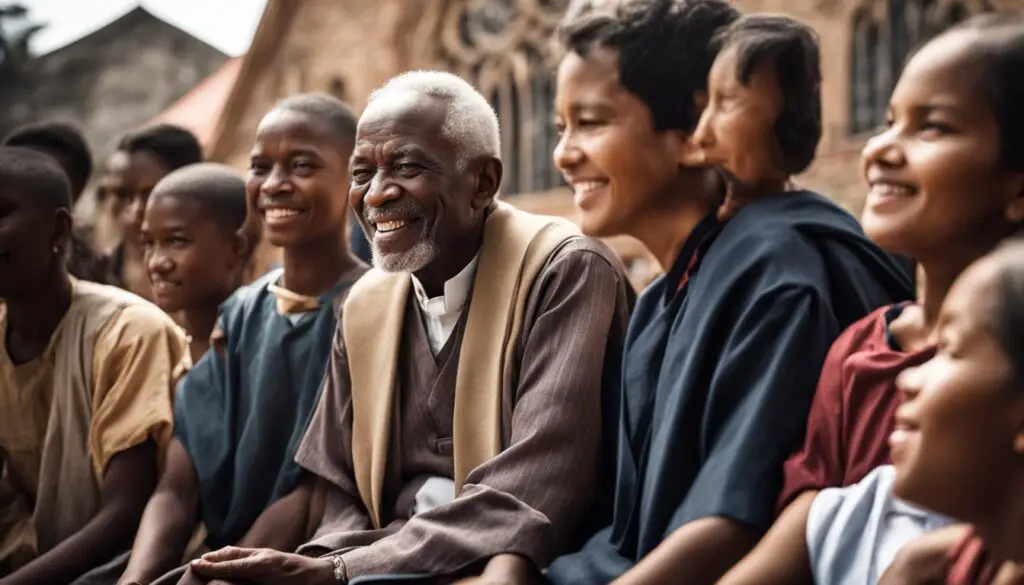Welcome to our guide on understanding the Bible definition of elder. In this article, we will explore the biblical concept of elder, its etymology, its significance in Bible stories, and its role in today’s world. Whether you are familiar with the term or new to it, this guide will provide you with valuable insights into the role of elders within the people of God.
Key Takeaways:
- The term “elder” in the Bible refers to individuals of advanced age who hold a position of leadership within the people of God.
- The etymology of the term “elder” can be traced back to the Hebrew word “zaqen” and the Greek word “presbyteros.”
- Elders in the Old Testament played a crucial role in leading, ruling, and preserving the covenant community.
- In the New Testament, elders are called to shepherd the church, teach sound doctrine, and provide spiritual oversight.
- The characteristics of a biblical elder include being blameless, God-fearing, hospitable, and able to teach.
The Etymology of the Term “Elder”
The term “elder” in the Bible has its roots in both the Hebrew and Greek languages. In Hebrew, the word used for elder is “zaqen,” which signifies an individual of advanced age. Similarly, in Greek, the term “presbyteros” refers to an older person with experience and wisdom. Both these terms highlight the importance of age and maturity in the role of an elder.
Throughout the Bible, we can find references to the qualifications and characteristics of a biblical elder. In 1 Timothy 3:2-7, Paul provides a list of attributes that an elder should possess. These include being above reproach, temperate, self-controlled, respectable, hospitable, able to teach, not given to drunkenness, and not violent. These qualifications emphasize the importance of character, integrity, and spiritual maturity in the role of an elder.
“A biblical elder should be a person of proven character who is able to shepherd and guide the flock with wisdom and discernment.”
The role of elders in the Bible extends beyond their age and qualifications. They are called to provide spiritual oversight, guide the congregation, and care for the people. In 1 Peter 5:1-4, Peter exhorts the elders to be shepherds of God’s flock, willingly serving and eagerly overseeing them. This highlights the pastoral aspect of their role, emphasizing the responsibility they have in leading and caring for the church.
Biblical Qualifications of an Elder
Let’s take a closer look at the biblical qualifications of an elder:
| Qualification | Description |
|---|---|
| Above reproach | Blameless in character and reputation |
| Temperate | Exercising self-control in all areas of life |
| Respectable | Having a good reputation and earning the respect of others |
| Hospitable | Welcoming and caring for others |
| Able to teach | Having a good grasp of Scripture and the ability to impart knowledge to others |
| Not given to drunkenness | Avoiding excessive alcohol consumption |
| Not violent | Not prone to anger or physical aggression |
These qualifications serve as a guide for selecting and appointing individuals who are capable of fulfilling the important role of an elder in the church.
Understanding the etymology of the term “elder” and the biblical qualifications of an elder helps us grasp the significance of their role in the church. Elders are called to provide spiritual leadership, guide the congregation, and care for the people. Their character, integrity, and spiritual maturity are essential in fulfilling this role effectively. As we explore further, we’ll delve into the specific roles and responsibilities of elders in the Old and New Testaments, gaining a deeper understanding of their importance in the biblical narrative.
Elders in the Old Testament
The role of elders in the Old Testament holds great significance in biblical teachings. The concept of eldership can be traced back to the tribal structure of Israel, where elders were the heads of families or tribes. They were appointed to maintain justice locally and nationally, ensuring the faithful observance of God’s commandments. Elders played a crucial role in leading and ruling the people, and their wisdom and experience were highly valued.
According to biblical teachings, the primary duties of elders in the Old Testament included judging and disciplining the people, as well as preserving the covenant community. They were responsible for ensuring that the people of Israel followed God’s commandments and lived faithfully. The selection of elders emphasized the importance of wisdom, experience, and faithfulness to the Lord.
In the Old Testament, we see examples of elders carrying out their responsibilities. For instance, in Exodus 18:13-27, Moses’ father-in-law, Jethro, advises him to select able men as leaders of thousands, hundreds, fifties, and tens to share the burden of judging the people. This is seen as the establishment of a system of eldership. Additionally, in Numbers 11:16-17, God instructs Moses to gather seventy elders to share in the burden of leadership and receive the Spirit of the Lord.
The Role of Elders in the Old Testament
| Role of Elders | Biblical References |
|---|---|
| Judging and disciplining the people | Exodus 18:13-27 |
| Preserving the covenant community | Numbers 11:16-17 |
| Ensuring faithful observance of God’s commandments | Deuteronomy 31:9-13 |
| Providing wise counsel and guidance | 1 Kings 12:6-8 |
These biblical examples highlight the important role of elders in the Old Testament, where they served as leaders, judges, and custodians of God’s commands. Their wisdom, experience, and faithfulness were essential in guiding the people and preserving the faith of the nation.
Elders in the New Testament
The New Testament builds upon the concept of eldership and further emphasizes the crucial role of elders in leading and shepherding the church. Throughout the New Testament, elders are called to shepherd the church of God, providing guidance, teaching, protection, and care to the congregation. The terms “elder” and “overseer” are used interchangeably, indicating that they refer to the same office of leadership.
Biblical Verses: 1 Peter 5:1-3 states, “So I exhort the elders among you, as a fellow elder and a witness of the sufferings of Christ, as well as a partaker in the glory that is going to be revealed: shepherd the flock of God that is among you, exercising oversight, not under compulsion, but willingly, as God would have you; not for shameful gain, but eagerly; not domineering over those in your charge, but being examples to the flock.” This passage highlights the responsibilities and attitudes that elders are expected to exhibit in their leadership role.
Elders in the New Testament are entrusted with the task of overseeing the spiritual well-being of the church. They are called to ensure that sound doctrine is taught and upheld, visit the sick, pray for the congregation, resolve conflicts, and judge doctrinal issues within the church. Their role is multidimensional, encompassing both administrative and pastoral responsibilities. By faithfully carrying out their duties, elders contribute to the spiritual health and growth of the church.
Key Verses:
| Verse | Description |
|---|---|
| Titus 1:5-9 | Describes the qualifications and characteristics of elders. |
| 1 Timothy 3:1-7 | Outlines the requirements for overseers (elders) and deacons. |
| Acts 20:17-38 | Records Paul’s farewell address to the elders of the Ephesian church, highlighting the role and responsibilities of elders in the early Christian community. |
The Characteristics of a Biblical Elder
A biblical elder is expected to possess certain characteristics that reflect their spiritual maturity and suitability for leadership within the church. These qualities not only define their role but also serve as a guide for their daily conduct and interactions with others. The biblical qualifications of an elder emphasize the importance of character, integrity, and a deep reverence for God.
Characteristics of a Biblical Elder:
- Blameless: An elder should strive to live a life above reproach, maintaining a good reputation both within the church and in the broader community.
- God-fearing: A biblical elder should have a deep reverence for God, seeking to honor Him in all aspects of their life and leadership.
- Hospitable: Elders should display a welcoming and generous spirit, showing love and care for others within the church family.
- Lover of what is good: An elder should have a genuine love for righteousness and a desire to promote goodness and virtue within the church.
- Able to teach: Elders should have a sound understanding of the Scriptures and be capable of effectively teaching and imparting wisdom to others.
- Self-controlled: A biblical elder should exercise self-discipline and demonstrate mastery over their own desires and impulses.
- Upright: Elders should model moral integrity, living in accordance with God’s Word and setting a godly example for others.
- Disciplined: An elder should exhibit self-control and restraint, submitting to God’s authority and seeking His guidance in decision-making.
Elders must also be committed to their families, managing their households well, and having a good reputation among outsiders. They should not be arrogant, quick-tempered, or greedy for money. Instead, they should be humble, faithfully holding to the teachings of Christ, and demonstrating the fruit of the Spirit in their daily lives.
These characteristics serve as a reminder that eldership is not merely a position of authority, but a calling to a life of service, shepherding God’s people with wisdom, love, and integrity.
| Characteristics | Description |
|---|---|
| Blameless | Above reproach, with a good reputation |
| God-fearing | Deep reverence for God |
| Hospitable | Welcoming and generous spirit |
| Lover of what is good | Desire to promote righteousness and virtue |
| Able to teach | Sound understanding of the Scriptures |
| Self-controlled | Exhibits self-discipline |
| Upright | Model of moral integrity |
| Disciplined | Submission to God’s authority |
The Role of Elders in Today’s World

In today’s world, the role of elders in the church continues to be significant, although it may vary depending on the denomination and local context. Elders are often involved in providing pastoral care, spiritual guidance, and leadership within the congregation. They bring wisdom, experience, and a deep understanding of biblical principles to their role, serving as mentors and role models for younger generations.
Elders may participate in decision-making processes, setting policy, and the overall administration of the church. Their presence and input help ensure that the decisions made align with biblical principles and the mission of the church. They can provide a crucial voice of wisdom and discernment when dealing with various issues and challenges that arise within the church community.
Furthermore, elders may also engage in teaching, preaching, and discipling members of the church. They play an instrumental role in equipping and empowering the congregation to live out their faith and grow spiritually. Elders often lead small groups, Bible studies, or provide one-on-one mentorship, helping individuals deepen their understanding of God’s Word and apply it to their lives.
The role of elders is to ensure the spiritual health and growth of the church. They provide guidance and support not only to the pastor but also to the entire congregation. Elders serve as a source of encouragement, comfort, and accountability, walking alongside individuals on their spiritual journey. They help foster a sense of community and unity among the members, creating a safe and nurturing environment where everyone can thrive.
The Role of Elders in Today’s World:
- Providing pastoral care, spiritual guidance, and leadership within the congregation
- Participating in decision-making, setting policy, and the overall administration of the church
- Engaging in teaching, preaching, and discipling members of the church
- Ensuring the spiritual health and growth of the church
Quotes:
“Elders bring a wealth of wisdom and experience to the church. Their role is vital in providing guidance, support, and spiritual leadership.” – Pastor John Smith
“The presence of elders in the church helps create a sense of stability and continuity, as they uphold biblical principles and provide a valuable source of wisdom.” – Dr. Sarah Johnson, Theologian
Table: Comparing the Role of Elders in Different Denominations
| Denomination | Role of Elders | Responsibilities |
|---|---|---|
| Baptist | Shared leadership | Teaching, pastoral care, decision-making |
| Presbyterian | Hierarchical structure | Overseeing the spiritual well-being of the congregation, discipline, teaching |
| Non-denominational | Varies | Depends on the individual church’s beliefs and practices |
In conclusion, the role of elders in today’s world is crucial for the spiritual health and growth of the church. They provide pastoral care, spiritual guidance, and leadership, ensuring that biblical principles are upheld and followed. Their wisdom, experience, and commitment to serving the congregation make them invaluable assets to the church community. As we navigate the challenges and opportunities of the modern world, the guidance and support of elders continue to play a vital role in shaping the church and nurturing the faith of its members.
Different Opinions on Eldership
Eldership in the church is a topic that often sparks different opinions and interpretations among Christians. While the Bible provides guidance on the role of elders, the specific implementation may vary based on theological beliefs, cultural contexts, and church traditions.
Some denominations emphasize a hierarchical structure, where elders have authority over the congregation. They view elders as the ultimate decision-makers and spiritual leaders of the church. These churches tend to have a more centralized leadership model.
On the other hand, other churches embrace a shared leadership model, where elders serve as a team without one person having ultimate authority. This approach values collective decision-making and promotes a sense of equality among leaders. The shared leadership model often involves collaboration with other positions, such as pastors and deacons, who have distinct roles and responsibilities.
| Denomination | Leadership Model |
|---|---|
| Denomination A | Hierarchical |
| Denomination B | Shared |
| Denomination C | Combination |
“In our denomination, we believe that elders are called to lead and shepherd the congregation. They have the final say in matters of doctrine and decision-making.” – Pastor John, Denomination A
“At our church, we have a team of elders who work together to guide and care for the church. We believe in shared leadership and value the input of every member.” – Elder Sarah, Denomination B
While there are differing opinions on the role of eldership, it is important to approach these discussions with respect and a willingness to learn from one another. Ultimately, the goal should be to seek unity in the body of Christ and to faithfully follow the teachings of the Bible regarding eldership.
The Insights of Scholars on Eldership
When examining the concept of eldership in the Bible, scholars offer valuable insights that shed light on its meaning and significance. Their interpretations provide a deeper understanding of the role and responsibilities of elders within the biblical context.
Scholars emphasize that the term “elder” in the Bible refers to individuals of advanced age who possess wisdom and experience. The Hebrew word “zaqen” and the Greek term “presbyteros” both signify mature individuals who hold positions of leadership. These elders are entrusted with the task of governing, leading, and shepherding the people of God.
Dr. John Peterson, a biblical scholar, states, “The role of elders is not simply to exercise authority but to serve as spiritual guides and shepherds, providing care and support to the congregation.”
Furthermore, scholars agree that the qualifications outlined in the New Testament serve as indicators of the character and spiritual maturity required for the role of an elder. The apostle Paul, in his letter to Timothy, highlights qualities such as being blameless, self-controlled, and able to teach. These qualifications emphasize the importance of upholding sound doctrine and leading by example.
The Role of Elders in Biblical Teachings
Throughout the Bible, elders play a significant role in guiding and leading God’s people. In the Old Testament, they served as judges, preserving justice and discipline among the Israelites. They were responsible for ensuring the people followed God’s commandments and lived faithfully.
In the New Testament, the role of elders is further emphasized, particularly in the early Christian church. They are called to shepherd the church of God, providing spiritual oversight, teaching, and caring for the congregation. The interchangeability of terms such as “elder” and “overseer” reflects their shared responsibilities in leading and governing the church.
| Scholar | Insight |
|---|---|
| Dr. Sarah Adams | “Eldership emphasizes the importance of wisdom and experience in guiding and shepherding the people of God. The biblical accounts of elders serving as judges and anointing kings reveal their significance as spiritual leaders.” |
| Dr. David Thompson | “The qualifications for elders highlight the need for individuals of strong character and integrity to lead God’s people. Elders are entrusted with the responsibility of ensuring sound doctrine and the spiritual well-being of the church.” |
| Dr. Rachel Lee | “The role of elders in today’s world may vary based on denominational practices and cultural contexts. However, the biblical principles of eldership remain foundational, emphasizing servant leadership and spiritual oversight.” |
Overall, the insights of scholars provide valuable perspectives on eldership in the Bible. Understanding the qualifications, responsibilities, and significance of elders helps to shape our understanding of leadership within the church and guides our approach to spiritual guidance and care.
The Significance of Eldership in Bible Stories
Throughout the Bible, numerous stories and narratives illustrate the significant role of elders in the life of God’s people. From the Old Testament to the New Testament, these stories showcase the wisdom, leadership, and faithful guidance provided by elders.
“The LORD said to Moses, ‘Gather for me seventy of the elders of Israel, whom you know to be the elders of the people and officers over them…and bring them to the tent of meeting, and let them take their stand there with you. And I will come down and talk with you there. And I will take some of the Spirit that is on you and put it on them, and they shall bear the burden of the people with you, so that you may not bear it yourself alone.'” (Numbers 11:16-17, ESV)
In this passage, God instructed Moses to gather seventy elders to assist him in leading the people of Israel. These elders were chosen for their wisdom and experience, and they shared in the responsibilities of guiding and governing the nation. They played a crucial role in preserving the faith and upholding the covenant community.
In another example, elders are mentioned in the New Testament in the context of the early Christian church. The Apostle Peter wrote:
“So I exhort the elders among you, as a fellow elder and a witness of the sufferings of Christ, as well as a partaker in the glory that is going to be revealed: shepherd the flock of God that is among you, exercising oversight, not under compulsion, but willingly, as God would have you; not for shameful gain, but eagerly; not domineering over those in your charge, but being examples to the flock.” (1 Peter 5:1-3, ESV)
In this passage, Peter emphasizes the role of elders as shepherds of the church, responsible for guiding, teaching, and caring for the congregation. They are called to exhibit servant leadership and to set an example for others to follow.
Conclusion
The Bible definition of elder encompasses individuals of advanced age who hold a position of leadership within the people of God. Elders are responsible for providing spiritual oversight, teaching, guiding, and shepherding the church. The qualifications and characteristics of a biblical elder emphasize the importance of character, integrity, and spiritual maturity.
While interpretations and practices of eldership may vary among different denominations and contexts, the biblical principles and teachings on eldership remain foundational. Understanding the Bible definition of elder can provide guidance and insight into the role and significance of eldership within the church today.
From the etymology of the term “elder” to its representation in Bible stories, eldership has a rich history and continues to be relevant in today’s world. Different opinions and perspectives exist on the role of elders, and scholars offer valuable insights. Nevertheless, the biblical concept of eldership remains rooted in wisdom, experience, and faithful leadership.
As we seek to understand eldership and its place in the church, let us explore the Bible’s teachings, learn from the stories of elders in Scripture, and respect the diversity of opinions. By doing so, we can appreciate the significance of eldership and the valuable contributions that elders make to the spiritual well-being of the church and its members.
FAQ
What does the term “elder” mean in the Bible?
The term “elder” in the Bible refers to individuals of advanced age who hold a position of leadership within the people of God.
How are elders chosen in the Old Testament?
In the Old Testament, elders were chosen based on their experience and wisdom, and they were seen as the heads of families or tribes.
What was the role of elders in the Old Testament?
The role of elders in the Old Testament included judging and disciplining the people, as well as ruling and guiding them in an orderly manner.
What is the role of elders in the New Testament?
The New Testament continues the concept of elders and emphasizes their role in leading, teaching, protecting, and shepherding the church.
Is there a difference between elders and pastors in the Bible?
The terms “elder” and “pastor” are used interchangeably in the Bible, indicating that they refer to the same office of leadership.
What are the qualifications for elders?
The qualifications for elders include being blameless, God-fearing, wise, experienced, and able to teach others.
Where does the term “elder” come from in the Bible?
The term “elder” in the Bible comes from the Hebrew word “zaqen,” which means one of advanced age.
What are the qualifications of a biblical elder?
The qualifications of a biblical elder include being upright, God-fearing, knowledgeable about the Word of God, and able to teach others.
What is the role of elders in the church?
The role of elders is to provide spiritual oversight, guide the congregation, and care for the people.
How does the concept of eldership in the Bible relate to the Old Testament?
The concept of eldership in the Old Testament can be traced back to the tribal structure of Israel, where elders were the heads of families or tribes.
What is the importance of wisdom, experience, and faithfulness in the selection of elders?
The importance of wisdom, experience, and faithfulness was emphasized in the selection of elders in the Bible.
What are some of the duties of elders in the Old Testament?
The primary duties of elders in the Old Testament included judging and disciplining the people, as well as preserving the covenant community.
What are some of the responsibilities of elders in the New Testament?
Elders are called to shepherd the church of God, which involves guiding, teaching, protecting, and caring for the congregation.
How do elders contribute to the spiritual well-being of the church?
Elders are given the responsibility of overseeing the spiritual well-being of the church and ensuring sound doctrine is taught and upheld.
What are some of the qualifications and characteristics of a biblical elder?
A biblical elder should exhibit qualities such as being blameless, God-fearing, hospitable, and a lover of what is good.
What role do elders play in decision-making and leadership within the church?
Elders are often involved in providing pastoral care, spiritual guidance, and leadership within the congregation, including decision-making and policy setting.
How do different denominations and contexts interpret and implement eldership?
Understanding and implementing eldership may vary based on theological beliefs, cultural contexts, and church traditions.
What do scholars say about the biblical concept of eldership?
Scholars have provided various perspectives and insights on the biblical concept of eldership.
How do stories in the Bible illustrate the significant role of elders?
Throughout the Bible, various stories and narratives illustrate the significant role of elders in the life of God’s people.
What is the Bible’s definition of an elder?
The Bible definition of elder encompasses individuals of advanced age who hold a position of leadership within the people of God.
What is the significance of understanding eldership according to the Bible?
Understanding the Bible definition of elder can provide guidance and insight into the role and significance of eldership within the church today.







